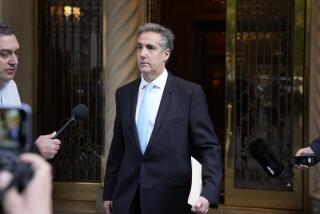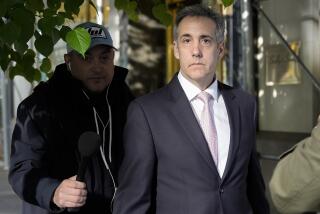Whitewater Accuser Testifies on Clinton, Loan
- Share via
LITTLE ROCK, Ark. — David Hale, a key witness in the government’s Whitewater case, testified Tuesday that he expected President Clinton to help repay an allegedly illegal $300,000 loan that he made in 1986 to one of Clinton’s investment partners, Susan McDougal.
Telling his story under oath for the first time, Hale, a soft-spoken former municipal judge, provided new details of the financial conspiracy that he claims to have entered with Clinton and others.
Attorneys for the defendants in the Whitewater-related case--Arkansas Gov. Jim Guy Tucker, Mrs. McDougal and her former husband, James B. McDougal--accused Hale of using his testimony in their trial to embellish on a story that they previously have characterized as a fabrication.
Hale previously has alleged that Clinton, then governor of Arkansas, pressured him in 1986 to make the loan to Mrs. McDougal from a government-backed small-business investment corporation that the witness then ran. But he has never before said that he expected Clinton to help repay the money.
When he was asked Tuesday who he thought was the actual borrower, he replied: “Jim McDougal and Bill Clinton.” Likewise, when he was asked whom he was expecting to repay the money, he replied: “I was looking to Jim McDougal and Bill Clinton.”
The loan is an important milestone in the Whitewater saga because $100,000 of it was used by Mrs. McDougal to buy a piece of property that was held briefly by the company created jointly by the McDougals and the Clintons to develop an Ozark Mountains resort known as Whitewater. Another $25,000 of it passed through the Whitewater bank account.
Although the Whitewater investigation has expanded over the last two years to cover many extraneous allegations, the inquiry began as an effort by government investigators to establish whether President Clinton had benefited improperly from his joint investment with the McDougals.
Both the president and McDougal repeatedly have denied that Clinton knew anything about the loan to Mrs. McDougal. Clinton, who has not been charged in the case, is expected to deny it again when he testifies by videotape in the trial later this month.
Hale said that the loan was put into Mrs. McDougal’s name primarily because Clinton did not want his name associated with the transaction. He quoted Clinton as telling him: “Be sure that my name cannot show up on it.”
The government contends that the loan was made in violation of laws governing lending by small-business investment corporations, which are regulated by the Small Business Administration. Hale already has pleaded guilty to making illegal loans from his corporation.
Hale recalled that he arranged the loan during a meeting with McDougal and Clinton on a cold, dark night inside a trailer that McDougal was using as a land development office south of Little Rock. Although the discussion that night centered on a $150,000 loan, Hale said, he later agreed to double the amount at McDougal’s request.
When he arrived at the trailer, Hale said, he found McDougal and Clinton chatting about politics and “cussing Frank White,” a former governor and one of Clinton’s political opponents.
After the discussion turned to business, he said, McDougal explained that he and Clinton wanted to borrow $150,000 for unspecified purposes but they wanted the official recipient to be McDougal’s wife.
“I said that would be fine,” Hale recalled.
He added that Clinton then offered to put up some “raw land in Marion County”--a reference to the Whitewater resort development that the Clintons and McDougals owned jointly in Arkansas--as collateral for the loan. But, Hale testified, McDougal said that he would guarantee the loan himself.
The $300,000 loan was made by Hale on April 3, 1986, to Mrs. McDougal, who used the funds to buy property and make improvements on a housing development that she already owned. The defense contends that she spent the money in a manner consistent with the application she made for the loan.
But Hale contends that the application Mrs. McDougal filed for the loan promised that the money would be used to capitalize her advertising business, known as Master Marketing. He said that McDougal later tried to revise the application to make it conform with his wife’s land investments.
Speaking for the defense, Bobby McDaniel, Mrs. McDougal’s attorney, told reporters after court adjourned for the day that Hale’s testimony contained a number of serious inconsistencies as well as what he described as “new material.” He pledged to point up these inconsistencies when he cross-examines Hale later this week.
McDaniel added: “It’s a fabrication that this money was to go to Bill Clinton.”
McDaniel said that Hale, who was sentenced last week to 28 months in jail as part of a plea bargain, fabricated the story about Clinton to win more lenient treatment from Whitewater independent counsel Kenneth W. Starr.
“Bill Clinton is his meal ticket to a light sentence,” McDaniel said.
More to Read
Get the L.A. Times Politics newsletter
Deeply reported insights into legislation, politics and policy from Sacramento, Washington and beyond. In your inbox twice per week.
You may occasionally receive promotional content from the Los Angeles Times.










